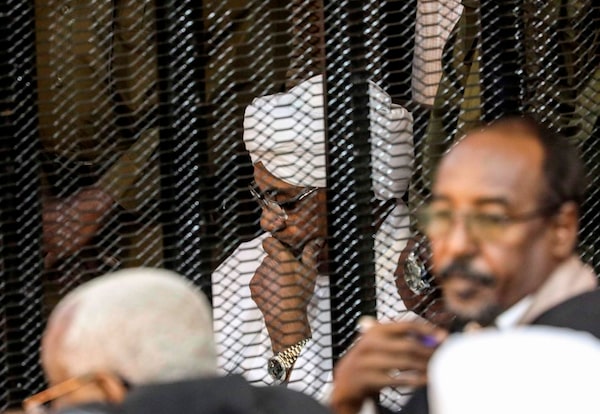
In this July 9, 2018, file photo, former Sudanese president Omar al-Bashir attends a ceremony at the Presidential Palace, in Ankara.The Associated Press
Sudan’s transitional government has agreed to hand over its deposed former president Omar al-Bashir to the International Criminal Court for prosecution on charges of genocide and war crimes in Darfur, officials say.
The agreement, reached during peace negotiations with Darfur rebel leaders on Tuesday, would be a huge victory for the ICC, which has struggled to pursue criminal charges against other influential political leaders and has obtained only a handful of convictions in its 18-year history.
Mr. al-Bashir, 76, was the first sitting head of state to be indicted by the international court, and his case has become a crucial test of the ICC’s powers. But he has evaded the court for the past 11 years. Despite the arrest warrants against him, he was able to travel widely to many countries, including ICC member countries, such as South Africa in 2015.
The decision to send Mr. al-Bashir to the international court is still subject to a final peace agreement between the government and the Darfur rebels. The decision could also be influenced by Sudan’s powerful military, which holds seats on the 11-member Sovereign Council, the body that oversees the transitional government. The military is believed to be divided on whether Mr. al-Bashir should be sent to appear before the ICC.
The handover, if it happens, is likely to be some months away, and some government officials said an ICC trial could be held within Sudan, rather than at the ICC’s headquarters in The Hague. It is unclear if the international court would agree to such a suggestion.
Mr. al-Bashir, who ruled Sudan for 30 years after seizing power in a military coup in 1989, was forced from office last April after months of street protests over a deteriorating economy and other grievances.
He was held in custody on corruption charges, but Sudan’s military commanders refused to send him to The Hague, saying it would be “an ugly mark on Sudan.” The military, however, has been forced to concede some of its power to the civilian-led transitional government.
The ICC indicted him in 2009 and 2010 on charges of genocide and war crimes in Darfur, a region of Sudan where more than 300,000 people have been killed and 2.7 million were forced to flee their homes as a result of a prolonged crackdown led by the military and pro-government militias.
Under the agreement reached on Tuesday with the Darfur rebel groups, Sudan would surrender not only Mr. al-Bashir but also two other senior leaders in his former regime who have also been indicted by the ICC.
Mr. al-Bashir was not explicitly named in the statements by government officials on Tuesday, but they made it clear that the agreement applied to all of the indicted ICC suspects, which would include him.
The agreement to send all of the indicted suspects to the ICC was confirmed by a government negotiator, Mohammed Hassan al-Taishi, who is also a member of the Sovereign Council, according to reports from Juba, capital of South Sudan, where the peace negotiations have been taking place.

In this Aug. 24, 2019 file photo, Sudan's autocratic former President Omar al-Bashir sits in a cage during his trial on corruption and money laundering charges, in Khartoum, Sudan.The Associated Press
“We can only achieve justice if we heal the wounds … and we cannot escape from facing these … without the appearance of those against whom arrest warrants were issued by the International Criminal Court,” Mr. al-Taishi told reporters in Juba, according to Al Jazeera.
He is a civilian member of the Sovereign Council, but military officials were included in the Sudanese delegation at the Darfur peace negotiations, suggesting that there is some military support for a handover to the international court.
Sudan is not a member of the Treaty of Rome, the ICC’s founding treaty. To surrender Mr. al-Bashir and others to the ICC, Sudan may have to join the treaty, which could further complicate any handover.
Mr. al-Bashir has been held in custody in Sudan for the past 10 months, but in relatively comfortable conditions.
In December, a Sudanese court convicted him of corruption and money laundering after US$130-million in cash was found in his home. He was sentenced to two years in a “reform facility,” rather than a prison.
Supporters of the ICC welcomed the decision to send Mr. al-Bashir to The Hague for trial. Mark Kersten, a Canadian scholar who has written extensively about the ICC, said a trial of the former Sudanese leader would be the biggest and most difficult in the court’s history.
The agreement to send him to the ICC is another example of how the court is dependent on domestic political events for its “big wins” – and the international court often has little influence over those domestic developments, Mr. Kersten said Tuesday on Twitter.
Amnesty International said the handover of Mr. al-Bashir to the ICC, if it happens, would be a “welcome step.” In a statement on Tuesday, Amnesty said the former president’s evasion of the arrest warrants for more than a decade has been a “historic outrage.”
Elise Keppler, associate director of the international justice program at Human Rights Watch, said she is still seeking details on the possible handover of Mr. al-Bashir to the ICC. But she tweeted: “This could be huge! Victims have been waiting for justice for widespread atrocities committed in Darfur for 15+ years.”
Our Morning Update and Evening Update newsletters are written by Globe editors, giving you a concise summary of the day’s most important headlines. Sign up today.
 Geoffrey York
Geoffrey York